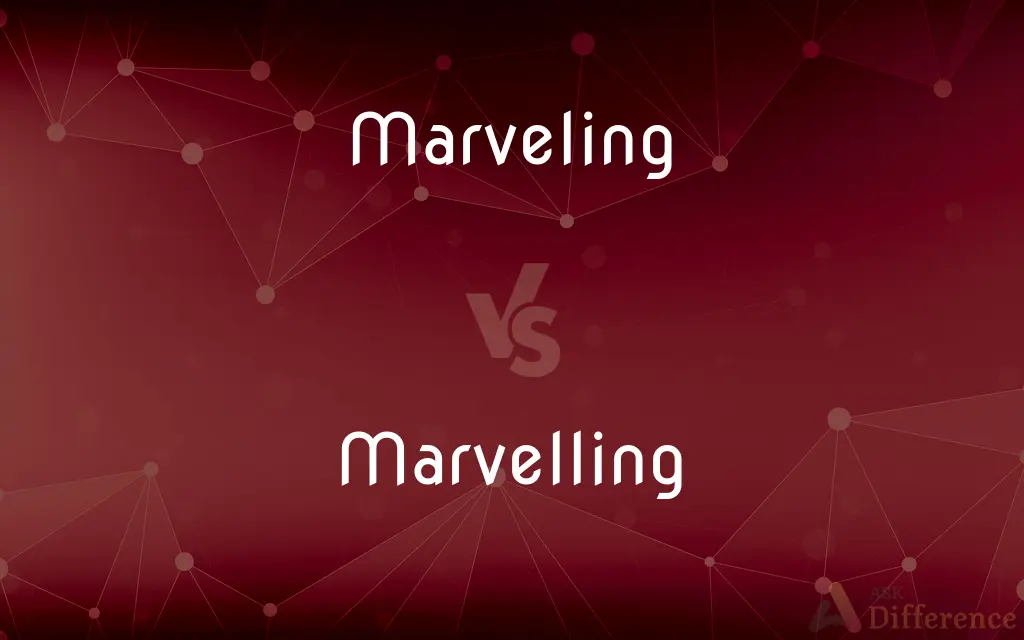Marveling vs. Marvelling — What's the Difference?
By Tayyaba Rehman — Published on October 11, 2023
Marveling and Marvelling are spelling variants; "Marveling" is American English, and "Marvelling" is British English, both meaning expressing wonder or astonishment.

Difference Between Marveling and Marvelling
Table of Contents
ADVERTISEMENT
Key Differences
"Marveling" and "Marvelling" refer to the same action of being filled with wonder or astonishment at something extraordinary. They are synonyms in meaning but differ in spelling due to regional language variations. "Marveling" is the preferred spelling in American English, adhering to the American English convention of using a single "l" in the conjugation of verbs.
In contrast, "Marvelling" adheres to the British English convention and is the accepted spelling in regions such as the United Kingdom and Australia. Here, verbs ending in a vowel plus "l" typically double the "l" when adding suffixes, hence the double "l" in "Marvelling."
Though the spelling difference is minor, it reflects broader trends in American and British English spelling variations, with words like "traveling/travelling" and "canceled/cancelled" following similar patterns. While "Marveling" and "Marvelling" may vary in spelling, their pronunciation and semantic meaning remain the same, expressing a sense of wonder, astonishment, or admiration.
Using the appropriate spelling based on the writing conventions of the specific English variant ensures correctness and avoids unnecessary distractions for the reader. Despite the orthographical differences, whether one is "marveling" at a sunset or "marvelling" at a piece of art, the essence of experiencing wonder and astonishment is universally understood.
Comparison Chart
Spelling Region
American English
British English
ADVERTISEMENT
Spelling Structure
Single "l"
Double "l"
Meaning & Pronunciation
Expresses wonder or astonishment; pronounced the same as Marvelling
Expresses wonder or astonishment; pronounced the same as Marveling
Usage Examples
Used in American publications and writings
Used in British publications and writings
Semantic Implication
No difference in meaning
No difference in meaning
Compare with Definitions
Marveling
Experiencing a sense of awe or amazement.
The crowd was marveling at the fireworks display.
Marvelling
Expressing astonishment or admiration in British English.
He spent the morning marvelling at the ancient ruins.
Marveling
To be filled with surprise or wonder.
She spent the day marveling at the city's architecture.
Marvelling
Showing fascination or admiration for something extraordinary in British spelling.
The scientist was marvelling at the complexity of the universe.
Marveling
Showing admiration or fascination for something extraordinary.
He stood marveling at the technological advancements.
Marvelling
Being filled with wonder or amazement, typically used in British English.
They were marvelling at the beauty of the landscape.
Marveling
Feeling extreme surprise or admiration for something unexpected.
She was marveling at the incredible performance.
Marvelling
Experiencing a sensation of awe or astonishment.
The child was marvelling at the colorful fishes in the aquarium.
Marveling
Expressing astonishment or admiration.
He was marveling at the breathtaking scenery.
Marvelling
Feeling surprise or admiration for something extraordinary, typically spelled in British English.
We sat marvelling at the stars in the night sky.
Marveling
One that evokes surprise, admiration, or wonder.
Marvelling
One that evokes surprise, admiration, or wonder.
Marveling
(Archaic) Strong surprise; astonishment.
Marvelling
(Archaic) Strong surprise; astonishment.
Marveling
To become filled with wonder or astonishment.
Marvelling
To become filled with wonder or astonishment.
Marveling
To feel amazement or bewilderment at or about
We marveled that they walked away unhurt from the car accident.
Marvelling
To feel amazement or bewilderment at or about
We marveled that they walked away unhurt from the car accident.
Marveling
Present participle of marvel
Marvelling
Present participle of marvel
Marvelling
The act of one who marvels; amazement.
Common Curiosities
Why do Marveling and Marvelling have different spellings?
"Marveling" is spelled with one "l" in American English, and "Marvelling" is spelled with two "l"s in British English, reflecting regional spelling conventions.
Does the difference in spelling affect pronunciation?
No, the difference in spelling does not affect the pronunciation; both words are pronounced the same way.
Can Marveling and Marvelling be used interchangeably?
While they have the same meaning and pronunciation, using the correct spelling for your audience’s English variant is preferable.
Can Marveling be used in formal writing in American English?
Yes, "Marveling" is the correct and formal spelling in American English.
Is there any difference in meaning between Marveling and Marvelling?
No, there is no difference in meaning between Marveling and Marvelling; they both express a sense of wonder or astonishment.
Is Marvelling the formal spelling in British English?
Yes, "Marvelling" is the formal and correct spelling in British English.
Does British English always double the "l" in such verb forms?
Typically, British English does double the "l" in verbs where the stress is on the final syllable of the base form, like "Marvelling."
Is Marvelling considered incorrect in American English writing?
Yes, in American English, the preferred spelling is "Marveling" with one "l".
Are Marveling and Marvelling used as verbs?
Yes, both "Marveling" and "Marvelling" are used as verbs, indicating the action of being filled with wonder or astonishment.
Can I use Marveling in British English writing?
It is preferable to use "Marvelling" in British English to adhere to the regional spelling conventions.
Share Your Discovery

Previous Comparison
Commercial Bank vs. Merchant Bank
Next Comparison
Sliding Friction vs. Rolling FrictionAuthor Spotlight
Written by
Tayyaba RehmanTayyaba Rehman is a distinguished writer, currently serving as a primary contributor to askdifference.com. As a researcher in semantics and etymology, Tayyaba's passion for the complexity of languages and their distinctions has found a perfect home on the platform. Tayyaba delves into the intricacies of language, distinguishing between commonly confused words and phrases, thereby providing clarity for readers worldwide.











































